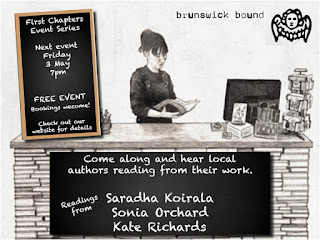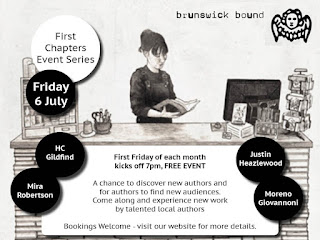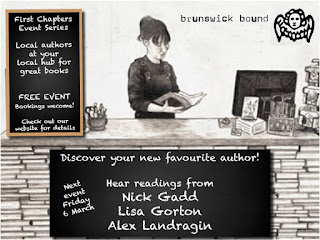First Chapters Q&A with Sonia Orchard
Sonia Orchard is the author of Something More Wonderful and The Virtuoso, which won the Indie Award for Best Debut Fiction of 2009. She has a PhD in Creative Writing and lives in the Macedon Ranges with her husband and three children.
Sonia will be reading from her new novel Into the Fire at First Chapters on Friday 3 May.
1.
Brunswick Bound has asked you to read a piece from your published work.
Tell us what we can expect from the piece you have chosen?
Intothe Fire is the story of a female friendship, remembered by one of the women –
Lara – shortly after her friend’s mysterious death in a house fire. In some
ways, it’s an examination of some of the complexities of modern womanhood –
balancing career and motherhood, gender politics, factional feminism – and the
choices women make and the ramifications of these choices. The excerpt I’m
reading is set after the first real rift in the women’s friendship – when Alice
(Lara’s friend) becomes a mother, and Lara is struggling with her conflicted
feelings around this. This is one of many times, during the novel, when we get
a glimpse into Lara’s past, and start to understand why Lara does some of the
things that she does. Lara is essentially a good person, but she ends up
betraying Alice, and this has catastrophic consequences. Why ‘good’ people do
‘bad’ things is something I’m really interested in. For me, the seed of Lara’s
betrayal can be seen in scenes like this one.
2.
How would you describe the kind of books that you write?
Emotional
survival always looms large in my stories – narrators trying to come to terms
with devastating events. Memory also plays a big role – I’m interested in why
people remember what they remember, what they leave out, what they fabricate –
essentially how people create the stories of their lives as an act of survival.
All of my narrators (including myself in my memoir!) are a bit deluded. But I
think all people are deluded to certain degrees, about certain aspects of their
lives – it could be regarding why they’ve chosen their line of work, their
partner, their hairstyle, their political views. I think being a little deluded
about your own motives, behaviour and leanings is quite normal, but it’s also
extremely fascinating.
3.
What was the first book that you read (or had read to you) that left an
impression on you?
The Quangle Wangle’s Hat (the Edward
Lear poem, illustrated by Helen Oxenbury). This was my favourite story as a kid
– I remember sitting in my room and reading it over and over; even when I was
well beyond picture books, I still loved it. I just wanted to be in that
Quangle Wangle tree, dancing and making music with all those crazy animals. It
has an incredible musicality to it, and it’s a fabulous celebration of
friendship, joy and the ridiculous. I was devastated when my three kids didn’t
love it as much as I did.
4.
Do you believe that books should answer life’s big questions?
No.
I think good novels should tackle issues around what it is to be human, but
leave resolutions up to the reader. Novels, to me, are more like very wise,
loving friends. So in the same way that friends can prompt you to work out your
own answers to your own questions, I think books can probably do the same. But
if a novel set out to provide a definitive answer to a ‘big question’, I
imagine most readers would find that quite annoying.
5.
Do you have any writing quirks?
Yes!
I’m terrible with qualifiers. My first drafts are full of the following words:
‘quite’, ‘almost’, ‘maybe’, ‘perhaps’. With the help of an editor, I remove a
lot of them, but I also keep a few if they work for the narrator’s voice. My
narrators all tend to be a little unsure of themselves, and grope around for
answers, so this is reflected in run-on sentences and speech and thought that
lack confidence.
6. What is your favourite word or phrase?
I
don’t have one, but I do love vernacular. If I was to set a book in Melbourne
in the 1970s, there would definitely be a character, at some point, saying,
‘For crying out loud’. Whenever I hear a phrase like that it takes me straight
back to my childhood. I love it.
7.
What have you found most surprising about publishing a book?
My
first published book was a memoir, so that threw me in the deep end in regards
to the publishing experience. But with that book, and my novels since, I’ve
always been surprised how seriously people take them – how people might take me
to task about something I’ve written, or tell me how angry a character has made
them. A part of me is really pleased people have responded so strongly, but I
also sometimes just want to remind them that it’s ‘just a book’ and that in my fiction,
none of the characters or events are real!
8.
What is the question that you hope never to be asked in an author Q&A?
I
don’t mind what I’m asked, as I can always choose how to answer a question. But
I do get frustrated when people approach my novels autobiographically and ask
me, for example, if a certain character is a certain person in my life. Fiction
writing is such a complex process, and characters and storylines can take many
years to take shape, and are affected by such a myriad of influences. Some of
the influences are autobiographical, but many are not, and they all end up in
the pot together, getting stirred around for years. To me, trying to extract
autobiographical detail from a novel really undermines what a fiction writer is
setting out to do.
9.
What question do you hope you will be asked and why?
‘How
does it feel to have sold one million copies?’ Only joking. Any question that
makes me feel like the reader has really engaged with and thought about my
novel, is a good one, and makes me pretty happy. Sometimes readers have asked
questions about Into the Fire that
have caught me by surprise, and made me see my novel or a character from a
different angle – I always love those questions.
10.
Which author that you have read do you think should be better known or more
widely read?
That’s
a hard one to answer, because many of my friends are, in my opinion,
exceptional writers, and should be more widely read! So I’ll just go with the
very last book that I’ve only just finished and am still thinking about:
Julienne van Loon’s The Thinking Woman.
Find out more about the First Chapters event series on the Brunswick Bound website.





Comments
Post a Comment